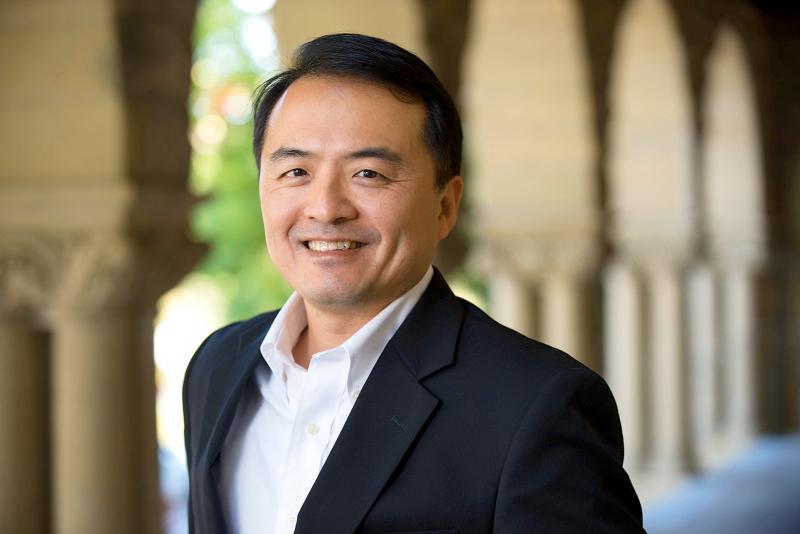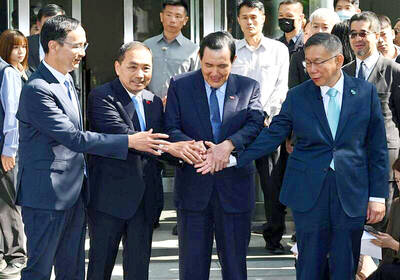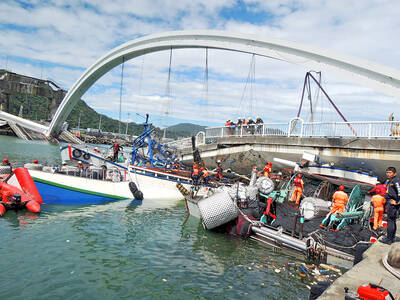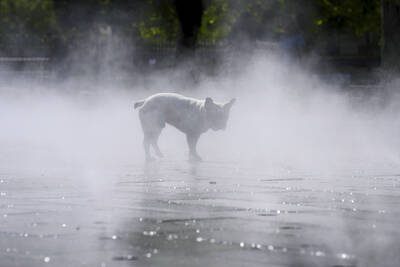There may be one coronavirus pandemic sweeping the globe, but every country lives its own pandemic differently, says public health expert Jason Wang (王智弘).
“People in Taiwan don’t know what the rest of the world is experiencing. It’s like living in a glass house,” the Taiwanese-American public health expert says when discussing how COVID-19 impacts Taiwan and the US. “It’s a different pandemic.”
But when it comes to a vaccine or therapeutics, he says, it will be necessary to understand the conditions that other countries experience.

Photo courtesy of the Lung Yingtai Cultural Foundation
“There is a lot of effort to develop biotech, medical technology for COVID from Taiwan, but if we don’t know what people [in other countries] are experiencing you can’t really do that effectively,” he says.
Wang, a pediatrician who has worked with the Taiwanese government on public health measures, and is currently on sabbatical from Stanford University where he teaches public health, lauds Taiwan’s efforts to combat the virus, but is sensitive to criticism of how the US has dealt with the pandemic.
‘GIVE ME LIBERTY’
While many have criticized the US’ handling of coronavirus, Wang says there are cultural reasons for how it has responded. Americans are acculturated from a young age to identify with individuality and freedom, he says, citing Patrick Henry’s famous dictum — “give me liberty, or give me death” — as a reason why many Americans refuse to wear masks.
“You almost have to be a sociologist or psychologist to really understand,” he says.
In addition, there are several logistical reasons why things like contact tracing can’t work effectively in the US, where there is no household registration. It can take days to reach those who have come into contact with the infected.
“And nobody picks up their phones anymore, no matter landline or mobile phones,” he says.
Quarantine is an even bigger political hot potato in the US, Wang says. Even if all 50 states enacted this protocol, it’ll tax the legal system and be dangerous for healthcare officials.
“People will take you to court,” he says. “Or they have guns.”
In contrast, Taiwan individualizes public health. Those exposed to COVID-19 are immediately quarantined and health officials will, using big data, locate everyone who has been in contact with the infected. After 14 days with no symptoms, the quarantine ends. In the US, Wang says, it is population-based, which means a whole city will have to shelter in place.
“So it is indiscriminate in the way you quarantine people,” he says. “In Taiwan, the whole thing is targeted. In the US the shelter at home is population based, so many people say: I don’t have COVID, why am I locked up?”
Wang says many of his American friends are anxious because they can’t do the things in life they enjoy, citing quality of life activities such as barbeques, hanging out with friends and taking their kids to soccer games.
“So this enjoyment... is also very important in the American psyche... and people can’t do these kinds of gatherings anymore,” he says.
As the pandemic rages across all 50 states, schools will start to close, which means that parents will have to find ways to care for many of the 50 million children. And the poor will be hardest hit.
Wang offers a litany of nightmare scenarios facing low income families: They have little to no savings and are being laid off en masse from their service industry jobs that provide them with health insurance. And it doesn’t bode well for the future.
“We are seeing a K-shaped recovery [in the US]... [I]t’s going to further widen the disparities in society,” he says.
I asked Wang if he thinks the election of president-elect Joe Biden will have any meaningful impact on how the pandemic is addressed.
“I don’t think it will matter,” he says, adding that there has been too much polarization in the US over the past year to expect a coherent response in the short term.
VACCINES VS THERAPEUTICS
Although Moderna’s announcement that its vaccine is close to 95 percent effective, Wang remains cautious that vaccines are the panacea to end the pandemic.
“That’s the wrong hope... Vaccines are unlikely, in my view, to be totally effective against coronavirus,” he says. “The chance of having an effective vaccine is 33 percent in the history of vaccine development. Even if we have an effective vaccine, we will need to ensure that enough people in the population are willing to get immunized to prevent the spread of the disease. In the US, only about half of the population surveyed are willing to get immunized.”
For other countries such as Taiwan, even if an effective vaccine were developed, producing it and administering it will take “at least another year.”
Wang is more confident with therapeutics.
“I believe in the next six months there will be very effective therapeutics, mostly in the form of either monoclonal antibodies or medications,” he says. “And when people realize they are not going to die from the virus then they can go out. Of course, people will still have to wear a mask, social distance and wash hands.”
Ultimately, there won’t be a one-size-fits all end to the pandemic.
“People are experiencing the pandemic very differently, so we have to respond to people’s needs very differently,” he says.
■ Jason Wang will give a talk today from 7pm to 9pm with former vice president Chen Chien-jen (陳建仁) about their personal life journeys. For details and registration information go to: cge.ntu.edu.tw/cl_n_64807.html.

Has the Taiwan People’s Party (TPP) changed under the leadership of Huang Kuo-chang (黃國昌)? In tone and messaging, it obviously has, but this is largely driven by events over the past year. How much is surface noise, and how much is substance? How differently party founder Ko Wen-je (柯文哲) would have handled these events is impossible to determine because the biggest event was Ko’s own arrest on multiple corruption charges and being jailed incommunicado. To understand the similarities and differences that may be evolving in the Huang era, we must first understand Ko’s TPP. ELECTORAL STRATEGY The party’s strategy under Ko was

Before the recall election drowned out other news, CNN last month became the latest in a long line of media organs to report on abuses of migrant workers in Taiwan’s fishing fleet. After a brief flare of interest, the news media moved on. The migrant worker issues, however, did not. CNN’s stinging title, “Taiwan is held up as a bastion of liberal values. But migrant workers report abuse, injury and death in its fishing industry,” was widely quoted, including by the Fisheries Agency in its response. It obviously hurt. The Fisheries Agency was not slow to convey a classic government

It’s Aug. 8, Father’s Day in Taiwan. I asked a Chinese chatbot a simple question: “How is Father’s Day celebrated in Taiwan and China?” The answer was as ideological as it was unexpected. The AI said Taiwan is “a region” (地區) and “a province of China” (中國的省份). It then adopted the collective pronoun “we” to praise the holiday in the voice of the “Chinese government,” saying Father’s Day aligns with “core socialist values” of the “Chinese nation.” The chatbot was DeepSeek, the fastest growing app ever to reach 100 million users (in seven days!) and one of the world’s most advanced and

It turns out many Americans aren’t great at identifying which personal decisions contribute most to climate change. A study recently published by the National Academy of Sciences found that when asked to rank actions, such as swapping a car that uses gasoline for an electric one, carpooling or reducing food waste, participants weren’t very accurate when assessing how much those actions contributed to climate change, which is caused mostly by the release of greenhouse gases that happen when fuels like gasoline, oil and coal are burned. “People over-assign impact to actually pretty low-impact actions such as recycling, and underestimate the actual carbon